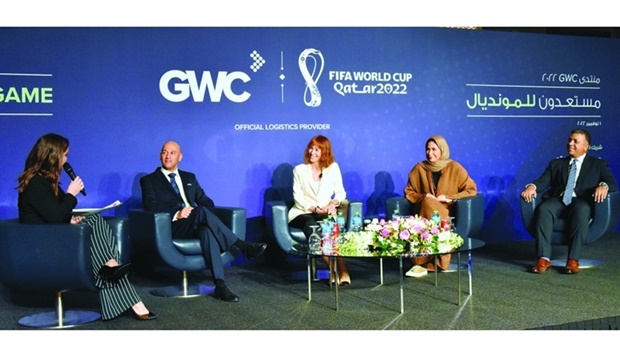The micro-small and medium-sized enterprise (MSME) sector in Qatar, which has been one of the country’s major economic drivers in the last 10 years, has “greatly benefited” from the hosting of the 2022 FIFA World Cup, an official of GWC has said.
Syed Maaz, chief business development officer, made the statement at a panel discussion during the GWC Forum 2022 titled ‘Ready for the Game’ held in Doha yesterday.
The panel session examined the direct and indirect impact of hosting the 2022 FIFA World Cup on MSMEs in various sectors of the Qatari economy. Maaz was joined by Jose Dhooma, FIFA head of Logistics; Nazli Berberoglu of The Coca-Cola Company; and Fatma al-Nuaimi, Supreme Committee for Delivery & Legacy (SC) Communications & Media executive director.
Maaz stressed that there has been significant growth in terms of what MSMEs have been providing to the economy: “In the last four years, there has also been a significant growth in terms of what MSMEs have been providing to the economy, which ties in with Qatar National Vision 2030 of diversifying away from the dependence on fossil fuel, and creating a self-sustaining economy.”
Dhooma pointed out that “in terms of logistics, we’re slightly ahead of where we need to be,” adding that the World Cup helped raise the bar for MSMEs to better understand international requirements.
According to al-Nuaimi, the government of Qatar has invested heavily in different mega projects, such as sports infrastructure and even SMEs, emphasising the importance of the participation of different players in both the public and private sectors.
With the investments and knowledge acquired from hosting the World Cup, al-Nuaimi noted that all companies that have worked with the SC could engage in knowledge transfer, build their profiles, and expand to markets beyond Qatar.
Maaz also said GWC has created an infrastructure to make doing business easy for new entrepreneurs and MSMEs, citing the 1.5mn sq m Al Wukair Logistics Park, which was launched in March this year.
Aside from funding or initial seeding, one of the major hurdles for MSMEs is logistics, said Maaz, stressing that GWC initiatives and facilities, such as the logistics park in Al Wukair, created a whole ecosystem for small enterprises.
“If MSMEs are on their own, they face different challenges, such as bringing in raw materials and manufacturing the finished product. So, we created an ecosystem where the park serves as an integrated logistics facility offering workshops and storage space, among other benefits,” he said.
Berberoglu said: “Supporting MSMEs means growing our business; worldwide, we have different programmes for supporting small enterprises to help them grow alongside the company. At the height of the Covid-19 pandemic, we supported small companies in their digitalisation journey to continue their businesses.”
She added: “We have been collaborating with small businesses in Qatar to create more opportunities for them during and even beyond the FIFA World Cup, as well as how they can leverage this period and the investments for the tournament, and grow their businesses on a long-term basis.”
Syed Maaz, chief business development officer, made the statement at a panel discussion during the GWC Forum 2022 titled ‘Ready for the Game’ held in Doha yesterday.
The panel session examined the direct and indirect impact of hosting the 2022 FIFA World Cup on MSMEs in various sectors of the Qatari economy. Maaz was joined by Jose Dhooma, FIFA head of Logistics; Nazli Berberoglu of The Coca-Cola Company; and Fatma al-Nuaimi, Supreme Committee for Delivery & Legacy (SC) Communications & Media executive director.
Maaz stressed that there has been significant growth in terms of what MSMEs have been providing to the economy: “In the last four years, there has also been a significant growth in terms of what MSMEs have been providing to the economy, which ties in with Qatar National Vision 2030 of diversifying away from the dependence on fossil fuel, and creating a self-sustaining economy.”
Dhooma pointed out that “in terms of logistics, we’re slightly ahead of where we need to be,” adding that the World Cup helped raise the bar for MSMEs to better understand international requirements.
According to al-Nuaimi, the government of Qatar has invested heavily in different mega projects, such as sports infrastructure and even SMEs, emphasising the importance of the participation of different players in both the public and private sectors.
With the investments and knowledge acquired from hosting the World Cup, al-Nuaimi noted that all companies that have worked with the SC could engage in knowledge transfer, build their profiles, and expand to markets beyond Qatar.
Maaz also said GWC has created an infrastructure to make doing business easy for new entrepreneurs and MSMEs, citing the 1.5mn sq m Al Wukair Logistics Park, which was launched in March this year.
Aside from funding or initial seeding, one of the major hurdles for MSMEs is logistics, said Maaz, stressing that GWC initiatives and facilities, such as the logistics park in Al Wukair, created a whole ecosystem for small enterprises.
“If MSMEs are on their own, they face different challenges, such as bringing in raw materials and manufacturing the finished product. So, we created an ecosystem where the park serves as an integrated logistics facility offering workshops and storage space, among other benefits,” he said.
Berberoglu said: “Supporting MSMEs means growing our business; worldwide, we have different programmes for supporting small enterprises to help them grow alongside the company. At the height of the Covid-19 pandemic, we supported small companies in their digitalisation journey to continue their businesses.”
She added: “We have been collaborating with small businesses in Qatar to create more opportunities for them during and even beyond the FIFA World Cup, as well as how they can leverage this period and the investments for the tournament, and grow their businesses on a long-term basis.”


